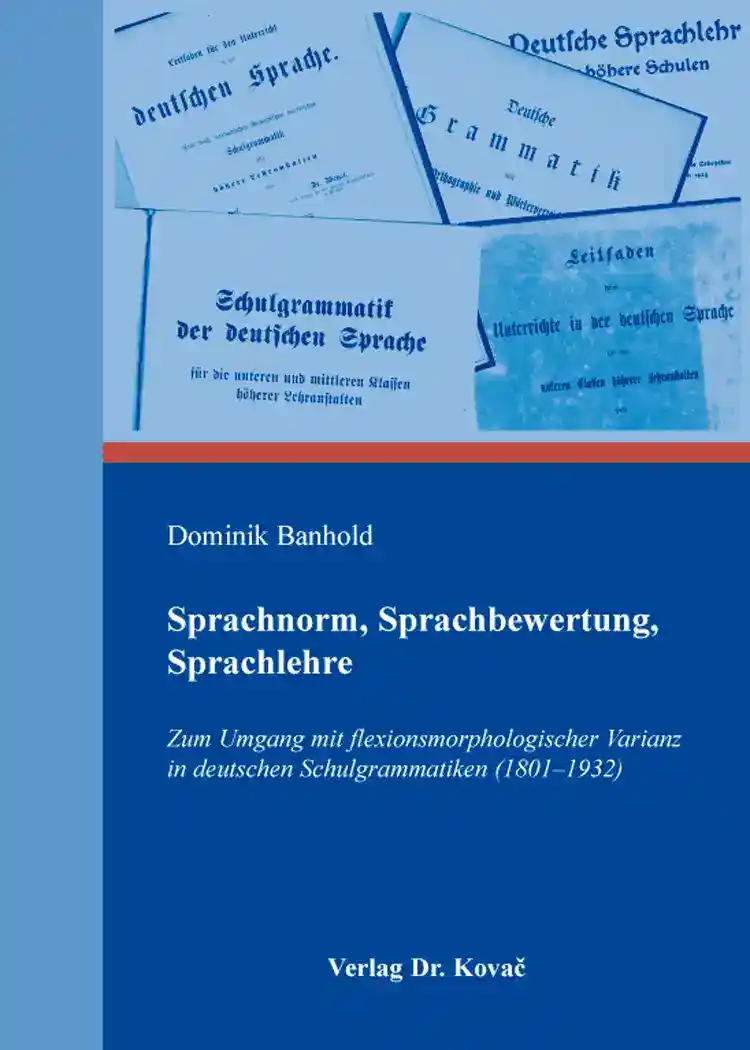Dominik BanholdSprachnorm, Sprachbewertung, Sprachlehre
Zum Umgang mit flexionsmorphologischer Varianz in deutschen Schulgrammatiken (1801–1932)
PHILOLOGIA – Sprachwissenschaftliche Forschungsergebnisse, volume 204
Hamburg 2015, 292 pages
ISBN 978-3-8300-8583-6 (print) |ISBN 978-3-339-08583-2 (eBook)
Rezensionen
[...] Neben der Frage, ob Varianz in historischen Schulgrammatiken überhaupt eine Rolle spielt und, wenn ja, wie viel Varianz die Autoren aus welchen flexionsmorphologischen Themenbereichen aufgreifen, wird die Darstellung von Varianz, zuvorderst die Markierungspraxis in Schulgrammatiken, beschrieben. Dabei werden die angeführten Marker in Gänze erfasst, um beispielsweise das metasprachliche Bewertungsvokabular der Grammatiker systematisiert darzubieten.
[...] beschäftigt sich D. Banhold mit einem Problem, das nicht nur aus sprachhistorischer Sicht von großem Interesse ist: Wie wird in Sprachkodizes, die ja maßgeblich für die Verbreitung und Stabilisierung von Sprachnormen verantwortlich sind, mit sprachlicher Variation umgegangen? [...]
Die Studie kann deutlich zeigen, dass Schulgrammatiken im 19. Jh. einen beachtlichen Anteil am Prozess der Ausbildung einer deutschen Standardsprache hatten.
About this book deutschenglish
A language contains different language variants (e.g. ich fragte vs. frug, die Bogen vs. Bögen, runder vs. ründer, unser vs. unsrer) the language users face. This fact is due to historical developments of a language and lead to the understanding in linguistics that a language is a diverse and complex system consisting of different varieties next to a standard variety. This understanding is of special importance when it comes to grammars or dictionaries that intend to codify the norms of a standard variety. This book is an analysis of historical German school grammars of the nineteenth and early twentieth century and it looks at the way how these codex texts depict morphological variants. The questions asked deal with the quantity of morphological variants included in these codex texts and then concentrate on how variants are marked by the grammarians. Apart from lists of markers that reveal the prescriptive metalanguage of school grammars this work also presents answers to questions touching upon correlations between evaluations and contextualizations in these texts (such as Are dialectal variants bad variants? Are colloquial variants stigmatized?). The study thus meets the ongoing interest of linguistic research in the younger history of the German standard language. Dealing with language variants in school grammars, it is not only a methodically innovative research study but also offers interesting insights into historical grammar teaching.Kontaktmöglichkeit
Keywords
19. Jahrhundert20. JahrhundertDeutschGermanistikGrammatikunterrichtLinguistikSchulgrammatikSprachdidaktikSprachgeschichteSprachkodexSprachliche ZweifelsfälleSprachnormSprachvarianteSprachwandelStandardspracheIhr Werk im Verlag Dr. Kovač

Möchten Sie Ihre wissenschaftliche Arbeit publizieren? Erfahren Sie mehr über unsere günstigen Konditionen und unseren Service für Autorinnen und Autoren.
